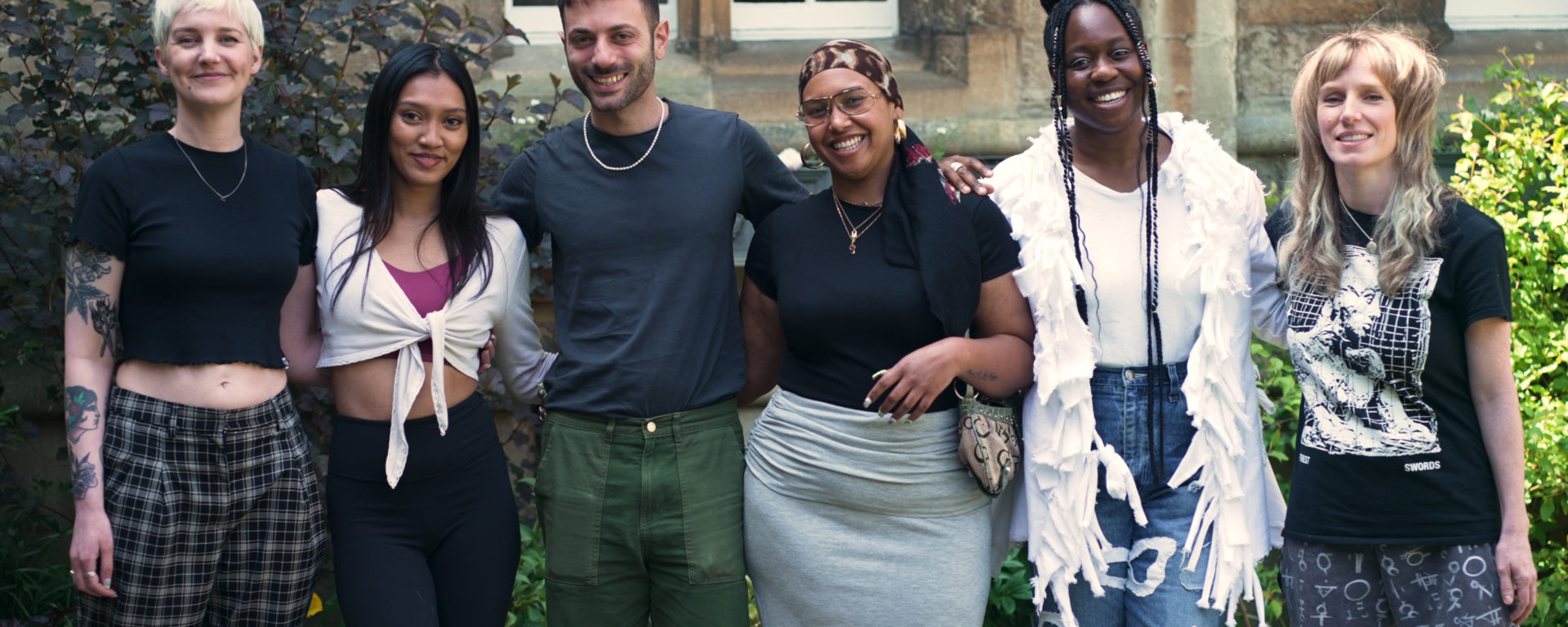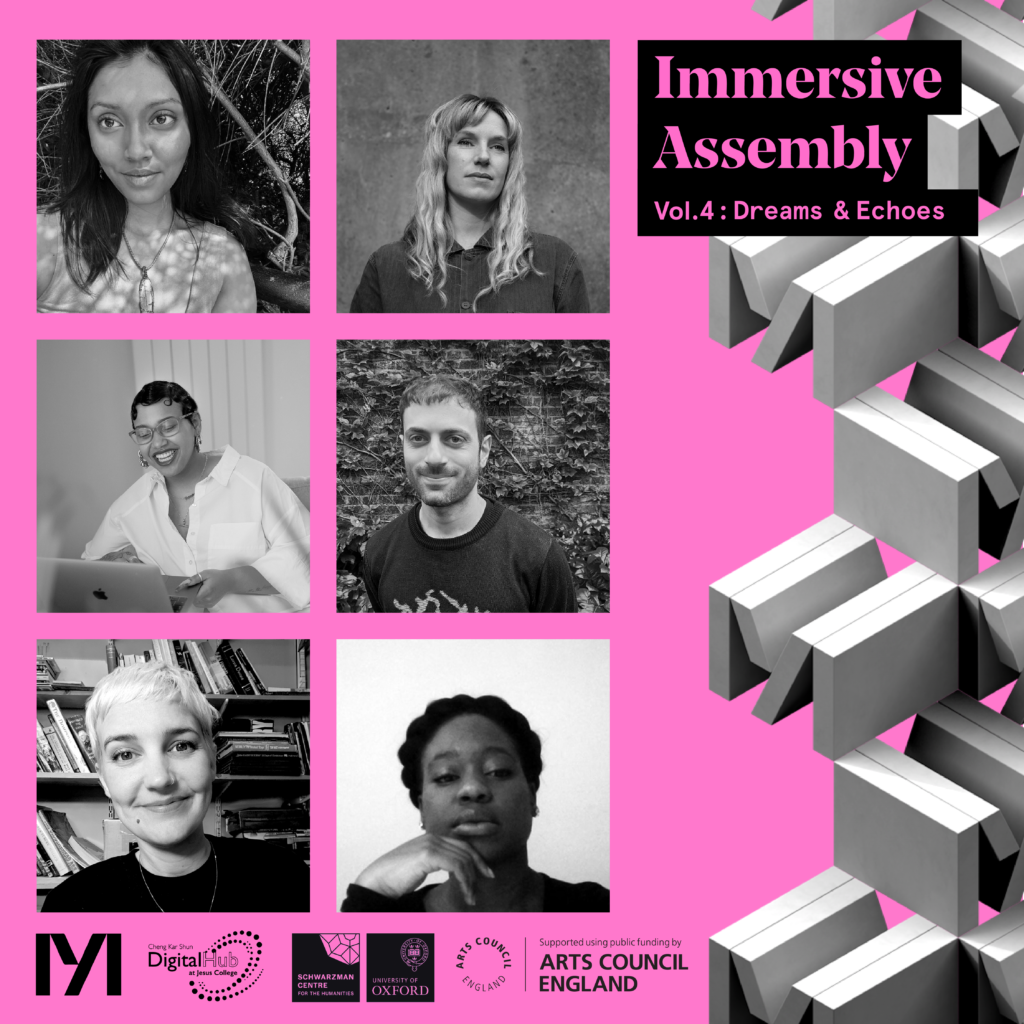
Mediale announces new cohort for talent development programme Immersive Assembly Vol. 4 supported by University of Oxford

A multidisciplinary artist residency exploring the potential of immersive art and technology to interrogate our notions of reality and consciousness
7 May 2024 : Mediale is delighted to announce the six creatives commissioned for Immersive Assembly Vol 4: Dreams & Echoes (IA4), their early career digital artists and creators development programme, supported by the Cultural Programme at The Stephen A. Schwarzman Centre for the Humanities, University of Oxford, and the Cheng Kar Shun Digital Hub at Jesus College, Oxford, a dynamic new space dedicated to exploring the latest advances in digital technologies.
Over five months, the programme will support the 2024 cohort to collaborate and develop projects inspired by the theme ‘Dreams & Echoes’. Working alongside a dedicated University of Oxford academic research partner, each creative will explore the potential of immersive media in interrogating our perception of consciousness and enabling new interpretations of ‘reality’ now and in the future.
As our understanding of consciousness evolves beyond human thinking, IA4 will provide participants with the opportunity to draw on the University’s world-leading research to explore areas such as neuroscience, mental health and medical science expertise, as well as cutting edge AI and ethics research, and globally leading immersive art.
John Fulljames, Director, Cultural Programme, says: ”This open call has seen a record number of applicants wanting to create new, innovative work with Mediale. We are delighted they will be working in partnership with researchers at Oxford University to develop new digital experiences. It was great to see so much talent and so many brilliant artistic ideas and exciting to think that some of these artists may in time make and present work in the Schwarzman Centre, Oxford’s new home for the humanities.”
Dr Janina Schupp, Curator, Cheng Kar Shun Digital Hub, says: “We are thrilled to welcome such a wonderful artist cohort, and our partners, to the Digital Hub at Jesus College, Oxford. The applications received already show the incredible potential of immersive media in creative practice, which will now be infused with cutting-edge academic research to generate unique creative discussions between artists and academics. We look forward to exhibiting the “Dreams and Echoes” generated through this stimulating collaboration.”
The six UK-based creatives comprising the 2024 IA4 cohort are:
- Vicky Clarke (Manchester) – a sound and electronic media artist whose work explores materiality, electrical phenomena and ritual. Working with sound sculpture, DIY electronics and human-machine systems, she explores our relationship to technology considering themes of human agency in autonomous systems, post-industrialisation and the techno-emotional states we experience through these networked interactions. Her work takes the form of composition and live AV performance, DIY machines & sculpture, digital art & research.
- Michelle Collier (Manchester)-a writer, artist and digital maker fascinated by why and how we tell stories – from ancient myth to modern lore, and everything in between. What do these stories say about us, our identities, our fears? How might we use stories to conjure new worlds? Michelle’s work spans illustration, print, games, immersive, digital art, XR, video, short fiction, experimental poetry and more.
- Chipo Mapondera (Margate) -a creative technologist exploring alternative realities rooted in Zimbabwean traditional cultures. Her work seeks to expand XR narratives and audiences, and to diversify cultural information, creating virtual worlds depicting multi-layered Afrofuturistic dreamscapes. Chipo is the founder of Global Digital Futures, the platform for cutting edge conversations on digital media and technology in the Global South.
- Jazmin Morris (Leeds) – a creative computing artist and educator, Jazmin’s practice and research explore representation and inclusivity within technology. She uses free and open-source tools to create digital experiences that highlight issues surrounding gender, race and power, focusing on the complexities of simulating culture and identity. Her work spans across a range of digital media with audience participation often a key part of her experiences.
- Alysha Nelson (London) – a multidisciplinary artist specialising in immersive performance and live art, exploring themes of cultural heritage, climate resilience, post-colonialism, and perception. Her practice encompasses theatre, visual art, virtual and augmented reality often using immersive technologies to champion and preserve marginalised histories and voices. She has collaborated with renowned VR & AR studios, arts, cultural, and educational institutes, democratising nascent technologies through affordable, accessible installations and immersive experiences for the general public.
- Chris Tegho (London) – a machine learning engineer with a focus on computer vision, language modelling, and generative models. Chris is particularly interested in the intersection of art and machine learning, exploring themes of multiplicity, relations to others, queer experiences of belonging, and movement. Recent collaborations include work with artist Zach Blas for the Berlin Biennale, which utilised diffusion models to synthesise video, and an installation commissioned by Arebyte Gallery, London and Secession, Austria, featuring text generation and addressing AI religiosity in the tech industry.
Tom Higham, Creative Director, Mediale says: “We’re so excited to be launching IA4 in collaboration with the Cultural Programme at the Schwarzman Centre, University of Oxford, and the Cheng Kar Shun Digital Hub at Jesus College, Oxford. The unparalleled research and academic expertise the artists have access to this year will no doubt result in some wonderful projects. Having received over 200 applications for this year’s programme, the standard keeps going up. The need, energy and momentum around well-designed talent development opportunities in digital art is impossible to ignore.”
The residency will conclude in November 2024 with a public showcase of three new immersive project prototypes developed by the cohort.
Learn more about Immersive Assembly Vol. 4 HERE

